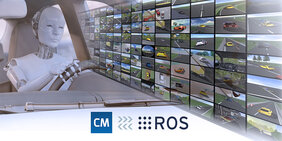Semi-automated and highly automated driving, two of the major trends in the automotive industry, require a multitude of tests to validate functions that can only be covered to a certain extent in real test drives. Virtual test driving is therefore becoming increasingly important to the validation of automated driving functions, as is the use of algorithms based on artificial intelligence (AI). For the necessary training of these AI algorithms, the simulation solution CarMaker can generate a variety of data as well as reproducible scenarios for the validation of automated functions – in no less than all development phases.
Artificial intelligence, which refers to machines imitating the human brain structures involved in thinking and learning, is already applied in a range of different fields of the automotive industry, such as for decision-making processes of ADAS, or object classification and interpretation that is fed by the sensors mounted on the vehicle. To enable actual automated and autonomous driving by means of AI algorithms, the system is provided with videos of real-world driving including the corresponding metadata during the learning process. Diverse road markings, road users, buildings, parked cars, etc. as well as various visibility and weather conditions such as fog, rain, light or dark complement the scenarios, enabling the vehicle to learn corresponding reactions. Neural networks trained this way can be applied in real time in the vehicle, for instance to detect other road users or traffic signs, or to trigger appropriate reactions even in complex traffic situations.
Using CarMaker, reproducible data can be generated virtually and labeled automatically with 100 percent accuracy. In the case of real data, this is only possible with enormous additional effort. Diverse scenarios, object lists for decision or path planning algorithms, or automatically labeled video data for object detection algorithms can thus be used to train neural networks. The inconceivable number of real test drives actually required for this is minimized with the help of virtual test driving, thereby saving time and costs.
In addition, CarMaker makes it possible to integrate and test AI algorithms in different stages and various forms in scenarios throughout the entire development period. “Using CarMaker to virtually test the fully trained algorithms in real scenarios and in the context of the whole vehicle allows for a higher level of maturity when applying the algorithm in a real vehicle. In addition, the use of the software solution on high-performance computing clusters enables larger test catalogs to be covered simultaneously, automatically, and with a subsequent analysis and report generation,” explained Martin Herrmann, Business Development Manager ADAS & Automated Driving.
Integration of AI algorithms into the CarMaker environment using ROS
Robot Operating Systems (ROS) is an open-source middleware platform originally developed for robotics that is increasingly applied for the development of automated driving functions. ROS is used for the exchange of information between individual algorithms and processes even when they are distributed across multiple computers.
CarMaker is the perfect complement to ROS-based virtual vehicle development. Given the openness of both systems, a coupling is possible without a problem, and the architecture of both systems enables all configurations required by the customer to be implemented. Additionally, the CarMaker environment incorporates a ROS node as a shared library. AI algorithms are able to exchange information via this ROS node through which they are integrated into the CarMaker environment, which allows algorithms to be tested in the holistic software environment. “This also makes it possible to separately analyze and test individual subsections of the algorithms within the simulation environment. CarMaker simulates the missing environment and offers the flexibility required for typical system and test designs,” said Martin Herrmann.
Find further information on the simulation solutions of the CarMaker product family here.
Read about other options of using our simulation software for the development process of your advanced driver assistance systems and automated driving functions here.
